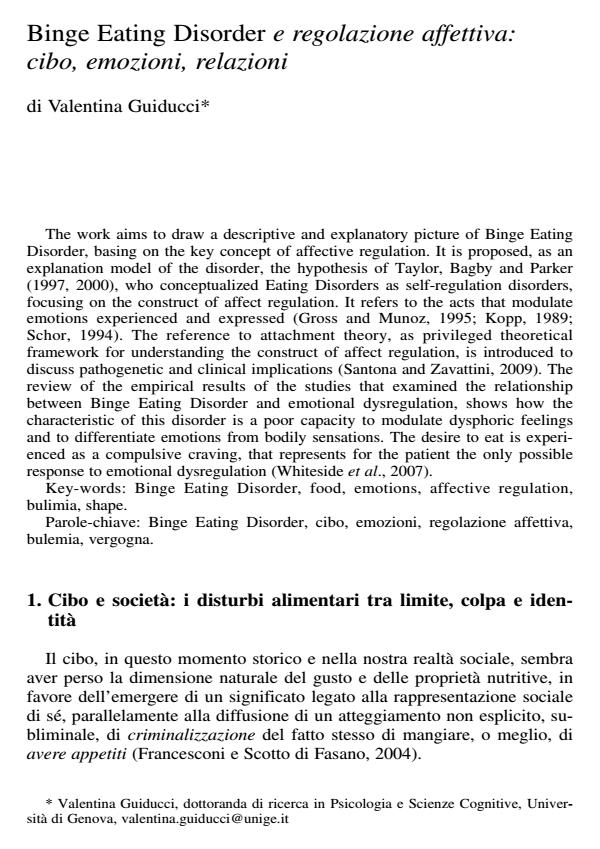Binge Eating Disorder e regolazione affettiva: cibo, emozioni, relazioni
Titolo Rivista SALUTE E SOCIETÀ
Autori/Curatori Valentina Guiducci
Anno di pubblicazione 2009 Fascicolo 2009/3
Lingua Italiano Numero pagine 17 P. 77-93 Dimensione file 93 KB
DOI 10.3280/SES2009-003005
Il DOI è il codice a barre della proprietà intellettuale: per saperne di più
clicca qui
Qui sotto puoi vedere in anteprima la prima pagina di questo articolo.
Se questo articolo ti interessa, lo puoi acquistare (e scaricare in formato pdf) seguendo le facili indicazioni per acquistare il download credit. Acquista Download Credits per scaricare questo Articolo in formato PDF

FrancoAngeli è membro della Publishers International Linking Association, Inc (PILA)associazione indipendente e non profit per facilitare (attraverso i servizi tecnologici implementati da CrossRef.org) l’accesso degli studiosi ai contenuti digitali nelle pubblicazioni professionali e scientifiche
Binge Eating Disorder e regolazione affettiva: cibo, emozioni, relazioni - The work aims to draw a descriptive and explanatory picture of Binge Eating Disorder, basing on the key concept of affective regulation. It is proposed, as an explanation model of the disorder, the hypothesis of Taylor, Bagby and Parker (1997, 2000), who conceptualized Eating Disorders as self-regulation disorders, focusing on the construct of affect regulation. It refers to the acts that modulate emotions experienced and expressed (Gross and Munoz, 1995; Kopp, 1989; Schor, 1994). The reference to attachment theory, as privileged theoretical framework for understanding the construct of affect regulation, is introduced to discuss pathogenetic and clinical implications (Santona and Zavattini, 2009). The review of the empirical results of the studies that examined the relationship between Binge Eating Disorder and emotional dysregulation, shows how the characteristic of this disorder is a poor capacity to modulate dysphoric feelings and to differentiate emotions from bodily sensations. The desire to eat is experienced as a compulsive craving, that represents for the patient the only possible response to emotional dysregulation (Whiteside et al., 2007).
Key-words: Binge Eating Disorder, food, emotions, affective regulation, bulimia, shape.
Parole-chiave: Binge Eating Disorder, cibo, emozioni, regolazione affettiva, bulemia, vergogna.
Valentina Guiducci, Binge Eating Disorder e regolazione affettiva: cibo, emozioni, relazioni in "SALUTE E SOCIETÀ" 3/2009, pp 77-93, DOI: 10.3280/SES2009-003005